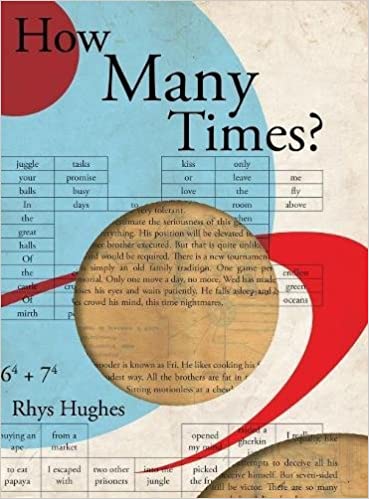 By RHYS HUGHES (Eibonvale; 2018)
By RHYS HUGHES (Eibonvale; 2018)
This one seems daunting, I will admit: a collection of unabashedly experimental tales based on mathematical formulae. To this end the skilled Rhys Hughes (of TALLEST STORIES) has created an extremely rigid set of rules (claiming “The point of experimental fiction is that one must never cheat with the rules and the rules are there to make the author’s life difficult”) that, in the opening section, decree each tale must contain a set number of paragraphs within a like-minded number of sentences, presented in groups (or powers) of four: 1x1x1x1, 2x2x2x2, 3x3x3x3, 4x4x4x4, 5x5x5x5, 6x6x6x6 and 7x7x7x7.
The absurdist narrative is unimportant, although for the record it involves a day at the office in which several employees are killed (as the opening sentence of the 4x4x4x4 section reads: “Killing employees is new. Never been done before. But times are changing. Work is getting harder”) and an escape to a secluded island where the protagonist becomes a cannibal, and later the captain of a hallucinatory sea vessel. Of a much greater importance is the author’s witty and playful prose, which yields up whimsical gems like “Who has ever really spoken in tongues? Why not speak in ears and cheeks? Speak in hands and listen in knees?”
The book’s second portion ups the difficulty meter appreciably, with its stories following the same overall principle as those of the first, but chopped up and contained in grids that read diagonally, in rows and in columns. The chief inspiration is the European literary movement OuLiPo, which specializes in constrained writing techniques, and Hughes has indeed placed a great many constraints upon himself. Luckily he’s also provided an appendix for “lazy readers” that renders many of the stories in a linear manner. The pleasures here are, once again, in the author’s rich and poetic turns of phrase, in sentences like “Colder than a hateful eye, with a menacing wave the sea breaks over me and a mermaid kisses me, but it is not you.”
Finally we have “Logical Love,” a “logico-erotic tale in which the permutations of the sexual acts are based on the workings of logic gates.” There’s a hint of J.G. Ballard in the resulting succession of scientifically detailed erotic encounters (“Benedict accepts that messy relationships and complicated geometries of lust can precisely replicate the effects of pure and simple love”) between multiple partners, with the primary concern being orgasms and when they occur.
I think it goes without saying that this book isn’t for everyone. The author concedes as much in the extensive nonfiction asides he provides, in which he admits that experimental fiction is “a type of literature that has generally fallen out of favor in recent years.” If you’ve read this far you’ll probably know if you’re among the receptive readers for HOW MANY TIMES?, and if so I can assure you that, at the very least, you’ll be in extremely capable hands.
